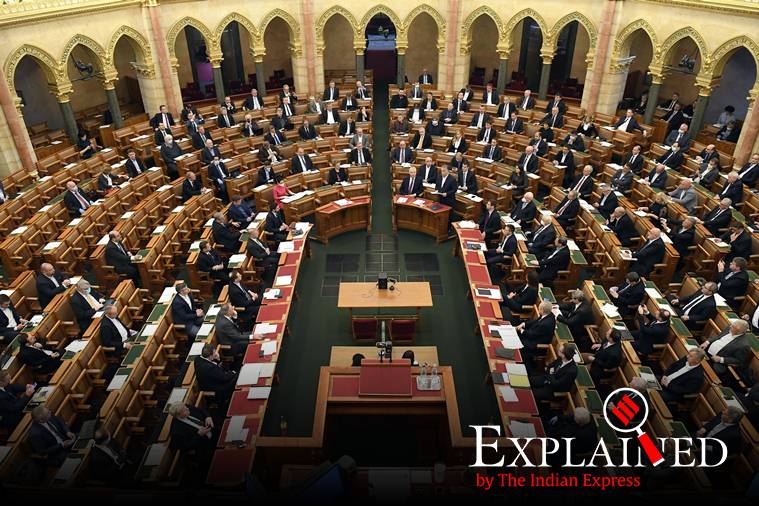Coronavirus: Why Hungary’s new Emergency law is raising eyebrows
Critics have said that the law could be used to silence independent media organisations, who are already struggling, and that public money would be spent on media that would follow the government line.
 Hungarian Prime Minister Viktor Orban during a business conference in Budapest, Hungary earlier this month. (Reuters/File Photo)
Hungarian Prime Minister Viktor Orban during a business conference in Budapest, Hungary earlier this month. (Reuters/File Photo)
On Monday, amid criticism from opposition parties and rights groups, Hungary’s Parliament passed legislation giving Prime Minister Viktor Orban extraordinary powers without an end date to deal with the coronavirus pandemic.
Orban’s government has defended the move and has said the measures would be revoked once the pandemic ends.
As of April 1, Hungary had 525 covid-19 cases, and 20 deaths.
Who is Prime Minister Viktor Orban?
Belonging to the conservative Fidesz party, Orban has been Prime Minister since 2010, and has adopted a hardline approach on matters such as immigration. His party currently enjoys a two-thirds majority in Hungary’s parliament.
During his time in power, Orban has strengthened his grip over the media and filled the courts with his supporters. He has been at loggerheads with rights organisations and the European Union throughout this period.
Explained: Are children less vulnerable to novel coronavirus?
He has often been quoted mocking the “liberal democracy” of European nations and voicing admiration for Russian President Vladimir Putin and Turkish President Recep Tayyip Erdogan.
Orban’s critics have accused him of undermining the rule of law and democracy in Hungary.
 Hungarian Prime Minister Orban, center right, delivers his speech about the current state of the coronavirus outbreak during a plenary session in the House of Parliament in Budapest, Hungary. (Tamas Kovacs/MTI via AP)
Hungarian Prime Minister Orban, center right, delivers his speech about the current state of the coronavirus outbreak during a plenary session in the House of Parliament in Budapest, Hungary. (Tamas Kovacs/MTI via AP)
Explained: How much do physical distancing measures contain coronavirus?
What the new law does
The new law has indefinitely extended the state of emergency which was declared in the country on March 11.
It also lays down imprisonment terms of up to five years for spreading false information or undermining efforts to tackle the pandemic.
The country’s parliament has also been suspended.
Critics have said that the law could be used to silence independent media organisations, who are already struggling, and that public money would be spent on media that would follow the government line.
📢 Express Explained is now on Telegram. Click here to join our channel (@ieexplained) and stay updated with the latest
Because it does not set a time limit when Orban would cease to have the additional powers, the law has been criticised by opposition parties within Hungary, as well as many of its partners in Europe.
Hungary’s leader of the opposition has said that passing the new law is akin to placing democracy in quarantine.
On March 20, Orban’s Fidesz party was suspended from the European People’s Party (EPP), a group of centre-right political parties in the European Parliament, of which the former has been a member for several years.
Denmark’s Conservative People’s Party has since asked for Fidesz’s expulsion from the group.
Hungary’s president, an Orban ally, has defended the new law, and said that it was in line with the country’s constitution as well as international treaties.
Here’s a quick Coronavirus guide from Express Explained to keep you updated: What can cause a COVID-19 patient to relapse after recovery? | COVID-19 lockdown has cleaned up the air, but this may not be good news. Here’s why | Can alternative medicine work against the coronavirus? | A five-minute test for COVID-19 has been readied, India may get it too | How India is building up defence during lockdown | Why only a fraction of those with coronavirus suffer acutely | How do healthcare workers protect themselves from getting infected? | What does it take to set up isolation wards?
- 01
- 02
- 03
- 04
- 05






































